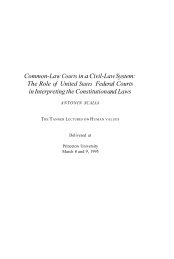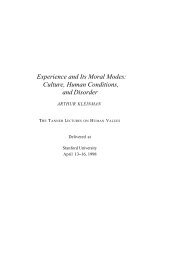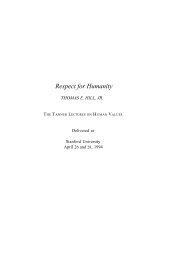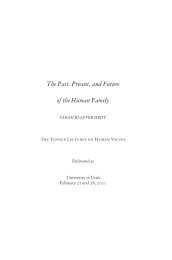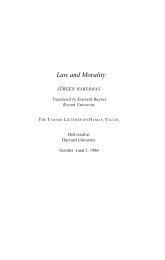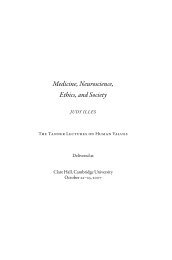Slote, Michael - The Tanner Lectures on Human Values
Slote, Michael - The Tanner Lectures on Human Values
Slote, Michael - The Tanner Lectures on Human Values
Create successful ePaper yourself
Turn your PDF publications into a flip-book with our unique Google optimized e-Paper software.
74 <str<strong>on</strong>g>The</str<strong>on</strong>g> <str<strong>on</strong>g>Tanner</str<strong>on</strong>g> <str<strong>on</strong>g>Lectures</str<strong>on</strong>g> <strong>on</strong> <strong>Human</strong> <strong>Values</strong><br />
cover in the sphere of individualistic rati<strong>on</strong>ality. 15<br />
<str<strong>on</strong>g>The</str<strong>on</strong>g> individualistic<br />
rati<strong>on</strong>al satisficer does not seek the best for herself and<br />
may sometimes deliberately reject the better for the good enough,<br />
and I think comm<strong>on</strong>-sense morality permits something rather similar<br />
within its sphere. C<strong>on</strong>sider an occasi<strong>on</strong> when a moral agent<br />
can choose to do either more or less good for others and where<br />
the choice of greater good entails no (relative) pers<strong>on</strong>al sacrifice<br />
to the agent and no violati<strong>on</strong> of de<strong>on</strong>tological restricti<strong>on</strong>s or sidec<strong>on</strong>straints.<br />
In such a situati<strong>on</strong> ordinary individuals sometimes do<br />
the lesser good for others and yet act in a way that ordinary<br />
morality would not c<strong>on</strong>demn or find unacceptable. I have elsewhere<br />
provided lengthy illustrati<strong>on</strong>s of these sorts of situati<strong>on</strong>s,<br />
and I shall not repeat the descripti<strong>on</strong>s here. <str<strong>on</strong>g>The</str<strong>on</strong>g> main point is<br />
that rati<strong>on</strong>al individualistic satisficing finds a parallel in comm<strong>on</strong>sense<br />
moral satisficing, and the latter phenomen<strong>on</strong>, in turn, evokes<br />
the further possibility of satisficing forms of (act-) utilitarianism<br />
and (act-) c<strong>on</strong>sequentialism. A c<strong>on</strong>sistent c<strong>on</strong>sequentialist can<br />
hold, for example, that an act is morally right if and <strong>on</strong>ly if its<br />
c<strong>on</strong>sequences are good enough in comparis<strong>on</strong> with the c<strong>on</strong>sequences<br />
of the other acts open to the agent. An act may be morally<br />
acceptable, even when there are alternatives whose c<strong>on</strong>sequences<br />
would be better, if its c<strong>on</strong>sequences are very good and close<br />
enough to the best that can be accomplished in the circumstances.<br />
And such a satisficing versi<strong>on</strong> of (utilitarian) act-c<strong>on</strong>sequentialism<br />
gains support not <strong>on</strong>ly from the prevalence and plausibility of<br />
moral satisficing within everyday morality, but also from any support<br />
we are able to give to the idea of rati<strong>on</strong>al individualistic satisficing,<br />
Satisficing act-c<strong>on</strong>sequentialism has distinct advantages<br />
that I have described elsewhere over prevalent optimizing forms<br />
of act-c<strong>on</strong>sequentialism, but there is no time here to pursue this<br />
purely moral-theoretic development of the idea of satisficing<br />
15 In my own c<strong>on</strong>tributi<strong>on</strong> to the symposium “Satisficing C<strong>on</strong>sequentialism,”<br />
and at greater length in chapter 3 of Comm<strong>on</strong>-Sense Morality and C<strong>on</strong>sequentialism<br />
(L<strong>on</strong>d<strong>on</strong>: Routledge & Kegan Paul, 1985).



